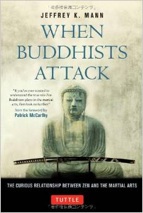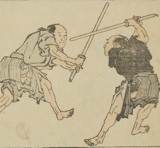When Buddhists Attack.
The Curious Relationship between Zen and the Martial Arts
by Jeffrey K. Mass
In my opinion, When Buddhists Attack is a poor read. In the introduction, the writer states that the majority of samurai was not an adherent of zen, only to continue throughout the book with commonplaces like the reason why “the samurai” were attracted to zen. He hardly makes any distinction in social background or status of the group that in the west for the sake of convenience is labelled “samurai”, nor does he clarify the impact of historical change on the relationship between zen and the samurai. What remains is a collection western concepts of zen and samurai that is at best outdated.
Over the last fifteen years or so some solid research has appeared on the Japanese warrior class. People like Thomas Conlan and Karl Friday have written trustworthy material, also on the religious background of the bushi, based on extensive research of Japanese sources. Jeffrey Mann has not done so; his book is entirely based on English language material, most of which is more than twenty years old. He for example quotes extensively form Zen & the Way of the Sword, written in 1993 by Winston King, for which no Japanese sources were used either. Other books he draws heavily on were written by D.T Suzuki and Nitobe, who are all but undisputed in their views on the topic.
The person most qualified to write about the relationship between zen and bushi/budo will probably be William Bodiford. As a professor of Asian Languages and Cultures he has published extensively on Japanese religions and his book Soto Zen in Medieval Japan is considered a standard work on the topic of Japanese zen. Moreover, he is a longtime practitioner of Kashima Shinryu kenjutsu and very knowledgable on koryu bujutsu. Mr. Bodiford had published a VERY good article (“Zen and Japanese Swordsmanship Reconsidered”) on the relationship between zen and kenjutsu in Budo Perspectives, edited by Alexander Bennett. The writer of When Buddhists Attack quotes from many of the other articles from this book, but ignores the one article that is most directly connected to the topic of his book. He even fails to mention it in his bibliography. Why?
The only reason I can think of is that the ideas of professor Bodiford do not fit the (as far as I am concerned outdated) views of mr. Mann. And here we have a problem. As an instructor in a Goju-ryu karate club, mr. Mann is entitled to having his own view on things and spreading this accordingly. As an associate professor at a university however, it should be his primary goal to present a picture that is based on the most reliable material available. By altogether ignoring the article of mr. Bodiford, mr. Mann shows little respect for his own scholarship and little respect for his audience.
If you want to know about the connection between zen and Japanese swordsmanship, read Bodiford.

Publisher: Tuttle Publishing
Language: English
ISBN: 978-4-8053-1230-8
